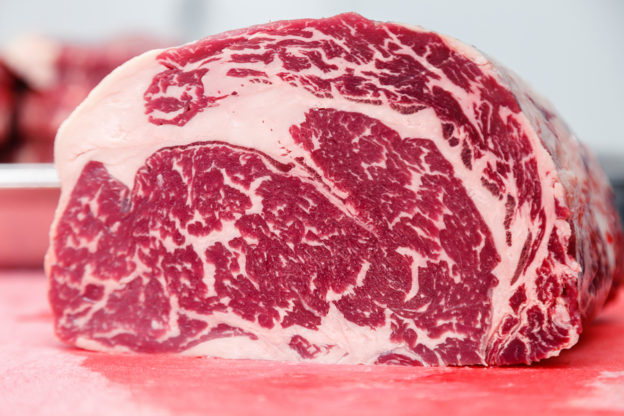By David Blyweiss, M.D., Advanced Natural Wellness
July 22, 2019
Despite popular belief among my patients and readers, I don’t have anything against red meat… as long as it is grass-fed and only takes up a small portion of your diet.
It’s never too late to take me up on this advice. And some day you may even thank me for it.
You see, higher red meat intake increases your risk of death from most of the health threats you are trying to avoid during your lifetime… like cancer, cardiovascular disease, and diabetes.
Let me explain…
Red meat provides a number of essential nutrients including carnitine, lecithin and choline.
Open your arteries, improve blood flow for a new health miracle...
Did you know your circulatory system has over 60,000 miles of arteries, veins and other blood vessels, if stretched end to end?
But as you age, your blood vessels undergo changes, which may cause them to stiffen, thicken and get clogged.
GOOD NEWS! Doctors have now identified a “Miracle Molecule” inside your arteries that helps OPEN your arteries and IMPROVE blood flow.
It’s what Dr. Valentin Fuster calls it, "One of the most important discoveries in the history of cardiovascular medicine."To you, that means...
- Healthy blood pressure
- Sharper mind and memory
- Skyrocketing energy and muscular strength
- Increased pleasure and passion in the bedroom
- Improved circulation to every cell and organ in your body
Go here to discover a new natural way to significantly boost the levels of this miracle molecule in YOUR body NOW!
These sound really healthy, right?
Well, it turns out that different microbes in your gut mess with these nutrients. As the bacteria metabolise and digest red meat, they produce something called trimethylamine N-oxide (TMAO) in a two step process.
The more red meat you eat, the more TMAO is generated… and the less able your kidneys are to get rid of it. So it starts building up. And you won’t believe how quickly it accumulates! On average, eating a diet high in red meat for just four weeks triples TMAO levels. (But that’s just an average. In some people, high red meat intake for a month can cause levels to skyrocket up to ten-fold.)
These high TMAO levels are extremely bad news for your health, and indeed may likely be a key risk factor for heart disease.
Here is the problem. TMAO makes your blood “sticky”. No one wants this since it is more likely for you to form clots and blockages. This, of course, greatly increases your risk of suffering a heart attack or stoke… or death. It actually kicks your chances of a cardiovascular event up by about 23%.
The link between TMAO and diabetes may be even stronger. In recent years we’ve discovered that higher levels of this compound are associated with an average of 89% higher odds of developing new onset type 2 diabetes.
The World's Quickest Solution for Ending Prostate and Urinary Misery
This has recently been revealed to be one of the only real breakthroughs in prostate health.
The seeds of a strange fruit (sometimes called "Chinese Apples") hold powerful phytonutrients that are a revolution in prostate health.
In fact, UCLA and Veterans Administration research have now proved this to be true.
Not only that, but it may be the worlds quickest solution for ending prostate misery.
Simply stated, these phytonutrients represent a huge step beyond beta sitosterol, saw palmetto, and other phytosterols alone.
Simply click HERE if you want to have fast prostate relief...restful, uninterrupted sleep...no more constant "urges to go"...enhanced virility...and optimal prostate support for life.
Since diabetes and heart disease go hand-in-hand, this could be even more devastating news for your heart health. Especially since TMAO is a significant marker for cardiovascular events among diabetic patients.
But that’s not the worst of it.
TMAO is also implicated in the development of gastrointestinal cancers. Simply put, it produces byproducts that appear to damage DNA and potentially even change the way your genes are expressed. (But not in a good way.)
This makes TMAO a big concern to your healthy longevity, and that’s a shame. Because getting your TMAO levels tested doesn’t require anything more than a simple blood test. This makes it extremely easy for you to find out where you stand the next time your physician performs blood work.
4 Surprising Tips to Lower Your TMAO levels
Red meat isn’t all bad… when you eat it in moderation. It offers healthy doses of protein, zinc, iron and B vitamins – especially when choosing grass-fed over commercial beef products.
That being said, there are a few ways to put you on the fast track toward ridding your body of excess TMAO.
- Cut red meat out of your diet for one month. During this time, production of TMAO will slow down. Plus, it will give your kidneys a chance to start flushing those high levels of it out of your body. By the end of four weeks, your levels of life-threatening TMAO will be drastically reduced.
- To speed up TMAO clearance even further, try adding more cold-pressed extra virgin olive oil, grapeseed oil, balsamic vinegar and red wine to your diet. These items are rich in something called DMB, which helps to stop your gut bacteria from producing TMAO.
- Resveratrol can also help. It not only inhibits TMAO production, it also helps thin out the sticky effect TMAO has on your blood. This, in turn, can greatly reduce your risk of a major cardiovascular event. I recommend at least 100 mg of resveratrol each day. Add 25 mg of pterostilbene (a close cousin to resveratrol) to help keep your TMAO levels in check.
- Eat more of a Mediterranean diet to maintain healthy TMAO levels in the long run. Choose healthy, plant-based foods like fresh organic fruits, veggies, beans and nuts. These should make up around 85% of your daily food intake. Fill in the rest with healthy animal proteins like wild-caught fish, pasture-raised poultry and small amounts of red meat. Use olive oil liberally. Have a small glass of red wine with dinner. Enjoy!
SOURCES:
Robert A. Koeth, et.al. l-Carnitine in omnivorous diets induces an atherogenic gut microbial pathway in humans. J.Clin. Investigation Dec. 2108
Zheng Y, et al. Association of changes in red meat consumption with total and cause specific mortality among US women and men: two prospective cohort studies. BMJ. 2019 Jun 12;365:l2110.
Wang Z, et al. Impact of chronic dietary red meat, white meat, or non-meat protein on trimethylamine N-oxide metabolism and renal excretion in healthy men and women. Eur Heart J. 2019 Feb 14;40(7):583-594.
Zhuang R, et al. Gut microbe–generated metabolite trimethylamine N‐oxide and the risk of diabetes: A systematic review and dose‐response meta‐analysis. Obesity Reviews. 2019; 20: 883– 894.
Shan Z, et al. Association between microbiota-dependent metabolite trimethylamine-N-oxide and type 2 diabetes. Am J Clin Nutr. 2017 Sep;106(3):888-894.
Leustean AM, et al. Implications of the Intestinal Microbiota in Diagnosing the Progression of Diabetes and the Presence of Cardiovascular Complications. J Diabetes Res. 2018; 2018: 5205126.
Oellgaard J, et al. Trimethylamine N-oxide (TMAO) as a New Potential Therapeutic Target for Insulin Resistance and Cancer. Curr Pharm Des. 2017;23(25):3699-3712.
Wang Z, et al. Non-lethal Inhibition of Gut Microbial Trimethylamine Production for the Treatment of Atherosclerosis. Cell. 2015 Dec 17;163(7):1585-95.
Chen ML, et al. Resveratrol Attenuates Trimethylamine-N-Oxide (TMAO)-Induced Atherosclerosis by Regulating TMAO Synthesis and Bile Acid Metabolism via Remodeling of the Gut Microbiota. MBio. 2016 Apr 5;7(2):e02210-15.







